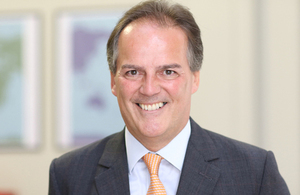Say NO to illegal wildlife products!
An op-ed by Mark Field MP, FCO Minister of State for Asia and the Pacific on VnExpress.

The illegal wildlife trade is an urgent problem; a more urgent problem than most of us realise. To give you just a few examples, when I was born in 1964, there were estimated to be over 4 million wild elephants. Today there are just 415,000 roaming in the wild.
When I became a British Member of Parliament in 2001, Vietnam still had wild tigers, rhinos, and elephants. Today, just 70 elephants remain in Vietnam and sadly tigers and rhinos are gone. Other unique and iconic species such as pangolin, saola, and several species of langur primates are critically endangered. Without stronger and quicker action it is estimated that these and species such as seahorses, giant clams, and rosewood will be extinct in the wild within a generation.
The illegal wildlife trade is a global problem. No one country is responsible. There are important roles for many to play. Vietnam is a source, transit as well as demand destination for illegal wildlife products. So its role is vital. Much has changed since I first visited Vietnam in 2013. There is greater public awareness of the problem, more collaboration with NGOs seeking to combat the trade, greater action by the government, and more seizures of illegal wildlife products. The government has committed to end bear farming and the bear bile trade by the end of the decade. Genuine and sustainable Progress is being made.
However, the scale of the problem is still huge and we aren’t yet winning the battle in Vietnam. Recent changes in the penal code can improve the ability to arrest and prosecute illegal traffickers. The traditional medicine community can continue to inform and persuade people that there are alternative remedies that do not include illegal wildlife. Doctors can help ensure that people take modern drugs for illnesses like cancer and are not tempted to use rhino horn which is proven not to work. And law enforcement capacity needs strengthening to detect shipments and disrupt more international criminal networks. Most importantly, we all need to adopt a zero tolerance approach to anyone who uses illegal wildlife products. Trophies made from illegal wildlife products aren’t a demonstration of wealth and power, in truth they are a demonstration of ignorance and bad taste. We can all say no, encourage our friends to say no and educate our children and grandchildren to do and think differently.
International cooperation, partnership and leadership are an essential part of the solutions needed. There is an excellent example of this in Hanoi today as British and Vietnamese officials from Customs, the Ministry of Public Security, Ministry of Agriculture and many others meet to share information on how all agencies of government plus airlines and airports need to work together if we are to turn the tide against the wildlife traffickers.
I want our cooperation to make a difference to action in Vietnam and the region but also to build international momentum. Vietnam hosting the Illegal Wildlife Trade Conference in November 2016 was an important moment, underlining the crucial role that Asia plays in this problem and its required solutions. Vietnam will have a prominent role when the next Conference in this series takes place in London in the Autumn of 2018.
While the scale and immediacy of the problem is acute, I remain optimistic and it’s important you are too. Vietnam’s recent history has shown how much can be achieved by strong and coordinated action. Vietnam has a young population and we are seeing a generational change in attitudes to the illegal wildlife trade helped by civil society and advocates such as artist/musician Thanh Bui who met the Prince William when he visited Vietnam last year.
Let me echo what Prince William said in his speech to the Hanoi Conference “halting the extinction crisis and ending the illegal wildlife trade presents a real chance to demonstrate our collective confidence that we have the power to rise to the big problems of our time”.